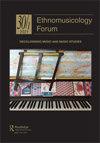Musical trail-making in Southern Appalachia
IF 0.5
1区 艺术学
0 MUSIC
引用次数: 0
Abstract
ABSTRACT This article examines the making of, and issues of cultural representation and engagement surrounding, two music heritage tourism trails in the Southern Appalachian region – the Blue Ridge Music Trails of North Carolina and Virginia’s The Crooked Road. Drawing upon ethnographic work, I explore how organisers create and map narratives of musical heritage across the trails’ respective terrains, navigating in the process several challenges pertaining to geography, economics, politics, and ethics. Through this analysis, I offer insight into the broader mechanisms of and tensions that suffuse cultural heritage work aimed at public audiences. More generally, I call for deeper critical engagement with the music trail phenomenon – a multi-sited tourism format within which music, heritage, and place intersect in compelling ways.阿巴拉契亚南部的音乐创作
摘要本文探讨了阿巴拉契亚南部地区两条音乐遗产旅游步道——北卡罗来纳州的蓝岭音乐步道和弗吉尼亚州的弯曲之路——的形成以及文化代表性和参与度问题。根据民族志工作,我探索组织者如何在小径各自的地形上创建和绘制音乐遗产的叙事图,并在这个过程中应对与地理、经济、政治和伦理有关的几个挑战。通过这一分析,我深入了解了面向公众的文化遗产工作的更广泛机制和紧张关系。更普遍地说,我呼吁对音乐之路现象进行更深入的批判性参与——这是一种多地点的旅游形式,音乐、遗产和地点以令人信服的方式交织在一起。
本文章由计算机程序翻译,如有差异,请以英文原文为准。
求助全文
约1分钟内获得全文
求助全文
来源期刊

Ethnomusicology Forum
MUSIC-
CiteScore
1.10
自引率
25.00%
发文量
29
期刊介绍:
Articles often emphasise first-hand, sustained engagement with people as music makers, taking the form of ethnographic writing following one or more periods of fieldwork. Typically, ethnographies aim for a broad assessment of the processes and contexts through and within which music is imagined, discussed and made. Ethnography may be synthesised with a variety of analytical, historical and other methodologies, often entering into dialogue with other disciplinary areas such as music psychology, music education, historical musicology, performance studies, critical theory, dance, folklore and linguistics. The field is therefore characterised by its breadth in theory and method, its interdisciplinary nature and its global perspective.
 求助内容:
求助内容: 应助结果提醒方式:
应助结果提醒方式:


